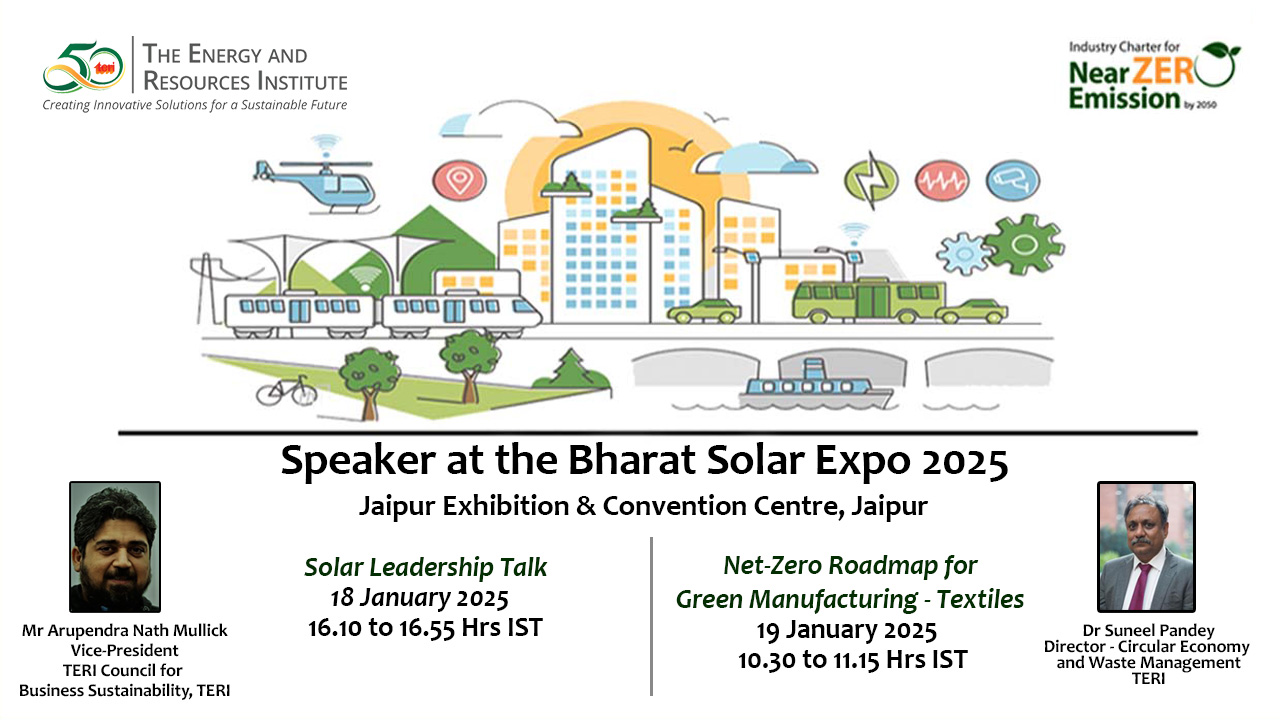TERI in Advisory Council of Net Zero Summit and Bharat Solar Expo

The Bharat Solar Expo is a significant event promoting solar energy solutions and technologies in India. In its past editions held in Rajasthan, the expo showcased advancements in solar technology, innovations in solar panels and inverters, energy storage solutions like batteries, and various solar energy applications in sectors like agriculture, water management, and rural electrification. the expo serves as a platform for stakeholders including government officials, industry experts, researchers, and investors to discuss policies, initiatives, and investment opportunities in the solar energy sector. Overall, the Bharat Solar Expo in Rajasthan plays a crucial role in raising awareness about solar energy, fostering collaborations, and driving the adoption of sustainable energy solutions in the region.
TERI is engaging with the Bharat Solar Expo 2025 as a member of the Advisory Council.
More information on the event is available here: https://events.firstviewgroup.com/BharatSolarExpo2025#/?lang=en
Solar Leadership Talk
TERI envisages that for India, the transition away from fossil fuels would be dependent primarily on the use of solar energy along with storage. Solar power has the dominant share in the goal of achieving 500 GW of fossil fuel-free capacity by 2030; the Central Electricity Authority (CEA) estimates that by 2030, solar capacity is expected to increase to over 270 GW. The goal of creating 500 GW of fossil fuel-free capacity by 2030 appears within reach. This needs large-scale storage to absorb excess solar power generation in the day and to supply it at night.
India has successfully achieved greater momentum in the development of solar power. India now has over 87 GW installed solar capacity, which is over four times what it had wanted to achieve by 2022—when it launched its National Solar Mission. As the share of electricity from renewables and storage begins to increase vis a vis flexible thermal power, the nature of distribution would undergo a transformation. The State Electricity Regulatory Commissions have a pivotal role in ensuring that this transition is smooth. A decision on the rate at which solar power would be bought by the Distribution Companies (Discoms) from the solar power generated by its consumers is an immediate need.
Rajasthan is one of the leading states when it comes to commissioned solar power with more than 1318 MW of solar power already in use. In order to push the adaptation of solar, the state government announced its solar energy policy in 2014 to add an additional capacity of 25,000MW in Rajasthan. It is estimated that solar parks of more than 500MW will be developed by joint ventures between the state government and private companies. The state has taken several steps such as fast-tracking the process of approvals for mega-large projects that are above 500MW outlining its commitment towards solar energy. The Solar Leadership Talk session at Bharat Solar Expo shall delve into the merging of policies and regulatory frameworks that can translate the vision of the state into reality. The session shall be moderated by Mr Arupendra Nath Mullick, Vice President – Council for Business Sustainability, TERI.
Net Zero Roadmap for Green Manufacturing – Textiles
Under the business-as-usual scenario, the textile industry by the year 2050 will contribute more than 25% of the global CO2 emissions. For India, the textile industry is the second largest employer after agriculture and contributes about 2.5% to the national GDP; India is the 6th largest exporter of textiles in the world. This industry contributes significantly to the Indian economy, and is one of the most fast-growing industries in the Indian context. It is imperative that we take a critical view of the entire life cycle of the textiles and quantify the environmental impacts at each stage of the supply chain, starting from fiber to fabric. The role of all the stakeholders involved in the supply chain of this industry will need to come together on a common platform and identify the control points, innovation, and collaboration. This will result in mainstreaming resource efficiency at different stages of the entire supply chain, reducing pollution load in different environmental matrices, taking a very significant step in combating climate change, and ensuring the sustainability of the planet.
Leading market players from the Indian Industry have come together to sign an ‘Industry Charter for Near Zero Emissions Ambition by 2050’ instituted by TERI. The existing Charter Signatories unanimously expressed their intent to make their companies exemplars of low or zero-carbon technology solutions within their sectors, and gradually bring more industry sectors into the fold of the Charter. The panel at the Bharat Solar Expo shall delve into an integrated approach for manufacturers in Rajasthan to build a circular system across the textile value chain while exploring the role of renewable energy, energy efficiency through long term investments in clean energy systems. The session will be moderated by Dr Suneel Pandey, Director – Environment and Circularity, TERI.
